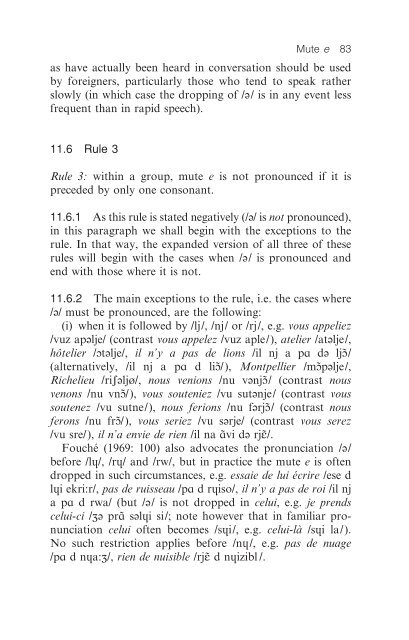An Introduction to French Pronunciation
An Introduction to French Pronunciation
An Introduction to French Pronunciation
You also want an ePaper? Increase the reach of your titles
YUMPU automatically turns print PDFs into web optimized ePapers that Google loves.
Mute e 83<br />
as have actually been heard in conversation should be used<br />
by foreigners, particularly those who tend <strong>to</strong> speak rather<br />
slowly (in which case the dropping of /c/ is in any event less<br />
frequent than in rapid speech).<br />
11.6 Rule 3<br />
Rule 3: within a group, mute e is not pronounced if it is<br />
preceded by only one consonant.<br />
11.6.1 As this rule is stated negatively (/c/ is not pronounced),<br />
in this paragraph we shall begin with the exceptions <strong>to</strong> the<br />
rule. In that way, the expanded version of all three of these<br />
rules will begin with the cases when /c/ is pronounced and<br />
end with those where it is not.<br />
11.6.2 The main exceptions <strong>to</strong> the rule, i.e. the cases where<br />
/c/ must be pronounced, are the following:<br />
(i) when it is followed by /lj/, /nj/ or /rj/, e.g. vous appeliez<br />
/vuz apclje/ (contrast vous appelez /vuz aple/), atelier /atclje/,<br />
hôtelier /btclje/, il n’y a pas de lions /il nj a pa dc ljf/<br />
(alternatively, /il nj a pa d lif/), Montpellier /mfpclje/,<br />
Richelieu /riʃcljø/, nous venions /nu vcnjf/ (contrast nous<br />
venons /nu vnf/), vous souteniez /vu sutcnje/ (contrast vous<br />
soutenez /vu sutne/), nous ferions /nu fcrjf/ (contrast nous<br />
ferons /nu frf/), vous seriez /vu scrje/ (contrast vous serez<br />
/vu sre/), il n’a envie de rien /il na evi dc rjh/.<br />
Fouché (1969: 100) also advocates the pronunciation /c/<br />
before /ld/, /rd/ and /rw/, but in practice the mute e is often<br />
dropped in such circumstances, e.g. essaie de lui écrire /ese d<br />
ldi ekri:r/, pas de ruisseau /pa d rdiso/, il n’y a pas de roi /il nj<br />
a pa d rwa/ (but /c/ is not dropped in celui, e.g. je prends<br />
celui-ci /ʒc pre scldi si/; note however that in familiar pronunciation<br />
celui often becomes /sdi/, e.g. celui-là /sdi la/).<br />
No such restriction applies before /nd/, e.g. pas de nuage<br />
/pa d nda:ʒ/, rien de nuisible /rjh d ndizibl /.












